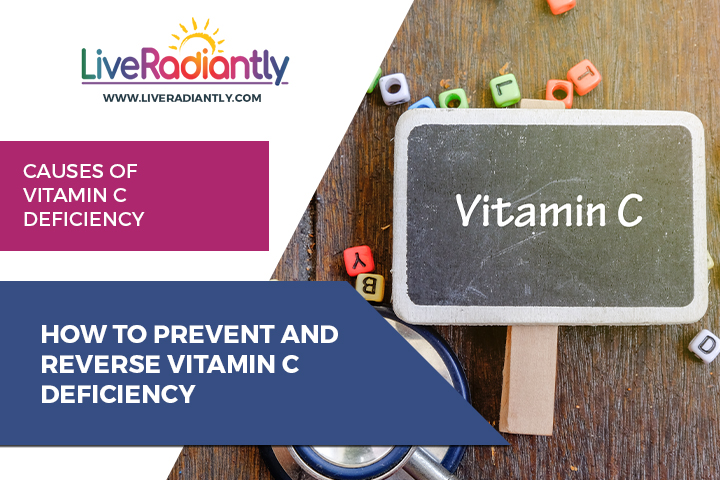How to Prevent and Reverse Vitamin C Deficiency
Did you know that vitamin C is one of the most important vitamins for your body? It helps protect you from infection, strengthens your immune system, and is necessary for healthy skin, teeth, and bones. Vitamin C deficiency can cause a wide range of health problems, including fatigue, depression, hair loss, and even scurvy. In this article, we will discuss the dangers and complications of vitamin C deficiency as well as how to prevent and reverse it.

Why Your Body Needs Vitamin C
Vitamin C is a powerhouse nutrient that plays a vital role in many bodily functions. It helps strengthen the immune system, promotes collagen production for healthy skin and bones, and even improves iron absorption. However, your body cannot produce vitamin C on its own, so it’s important to include plenty of vitamin C-rich foods in your diet.
Citrus fruits, like oranges and grapefruits, are popular sources of this vitamin, but vegetables, like broccoli, bell peppers, and kale, also contain high amounts. Including these foods in your routine can have a positive impact on overall health and well-being. It’s crucial to note that supplements can be a convenient way to increase vitamin C intake, but they should not replace whole foods in a balanced diet. Speak with your healthcare provider about the right amount of vitamin C for your individual needs. Don’t let this essential vitamin be missing from your daily routine.

Symptoms Of Vitamin C Deficiency
Vitamin C is a vital nutrient that supports immune function, collagen production, and iron absorption. By regularly consuming vitamin C-rich foods or supplementing, you can ensure that your body has enough of this essential vitamin. However, a deficiency in vitamin C can lead to various symptoms, including fatigue, weakness, and delayed wound healing.
In severe cases, scurvy may develop, causing gum disease and bleeding gums. It is also common for those with a vitamin C deficiency to experience dry and splitting hair, rough and dry skin, and easy bruising. In infants and children, this deficiency can result in dental issues and poor growth. If you suspect that you may have a vitamin C deficiency, it is crucial to speak with a healthcare provider who can test your levels and recommend appropriate treatment methods. Eating more citrus fruits or leafy greens as well as increasing your overall fruit and vegetable intake can help address these deficiencies and improve your overall health.

Causes Of Vitamin C Deficiency
Vitamin C plays an essential role in maintaining healthy skin, bones, and blood vessels. Despite its importance, vitamin C deficiency, also known as scurvy, is not uncommon. One of the most common causes of vitamin C deficiency is a lack of dietary intake. Many fruits and vegetables are rich in vitamin C, so individuals who do not consume enough of these foods may be at risk of deficiency. In addition, poor absorption due to conditions such as celiac disease or inflammatory bowel disease can also lead to a deficiency.
Another potential cause is excessive alcohol consumption, which interferes with the body’s ability to absorb and utilize vitamin C. Fortunately, symptoms such as bruising easily and gum inflammation can often be reversed with increased dietary intake or supplementation. However, it is critical to note that vitamin C toxicity can occur with overconsumption, so it is important to speak with a healthcare provider about the proper dosage for individual needs. While rare, certain genetic disorders can also cause a deficiency in vitamin C. Overall, consuming sufficient vitamin C from dietary sources or supplements can help prevent deficiencies and maintain overall health.

Dangers And Complications Of Vitamin C
Vitamin C is often touted as a cure-all and can be found in many over-the-counter supplements, but it’s critical to remember that with any substance, there can be potential risks and complications. In large doses, vitamin C can cause stomach discomfort and diarrhea. It may also interact with certain medications, including blood thinners and diabetes drugs. More concerning are recent studies linking high dosages of vitamin C to an increased risk of kidney stones.
Additionally, some research suggests that excessive intake of vitamin C may have a pro-oxidant effect, causing cellular damage instead of the desired antioxidant benefits. Ultimately, it’s best to consult with a healthcare professional before regularly taking large doses of this supplement or any other vitamin or mineral. The adage “everything in moderation” rings true when it comes to maintaining your health and well-being.

How To Prevent And Reverse Vitamin C Deficiency
Vitamin C is a vital nutrient that helps support immune function, promotes collagen production, and acts as an antioxidant. Unfortunately, many people do not get enough vitamin C in their diets and may even experience symptoms of deficiency. The good news is that there are simple steps you can take to prevent and reverse a vitamin C deficiency.
First and foremost, incorporating foods high in vitamin C into your diet is key; fruits, like oranges, grapefruits, strawberries, and kiwis, are excellent sources of this nutrient. Vegetables, such as bell peppers, broccoli, kale, and Brussels sprouts, also contain high levels of vitamin C. In addition to eating these foods regularly, taking a supplement may also help make up for any nutritional gaps in your diet. It’s critical to always check with your healthcare provider before starting any new supplement regimen. Taking care to ensure adequate intake of vitamin C can help keep your body functioning at its best.

Vitamin C Supplements
Vitamin C is a crucial vitamin for maintaining overall health and well-being. Luckily, it is widely found in fruits and vegetables, such as oranges, strawberries, bell peppers, and broccoli. However, some individuals may find it difficult to get an adequate amount of vitamin C through diet alone. In such cases, taking a supplement can be beneficial.
Vitamin C supplements come in both pill and powder form and can be taken daily to ensure proper levels of this significant nutrient. It helps promote strong immune function, collagen production for healthy skin and bones, iron absorption, and the maintenance of brain health. While most adults will only require a daily dosage of 65-90 milligrams per day, consulting with a doctor or nutritionist may help determine an appropriate amount for your individual needs. Overall, adding a vitamin C supplement to your daily routine can have positive effects on your short-term and long-term health.
A vitamin deficiency can cause several health problems, so it’s important to take steps to ensure adequate intake of this essential nutrient. Vitamin C is found in many fruits and vegetables and can also be taken in supplement form. Taking care to include this vitamin in your diet can help improve your overall health and well-being.









